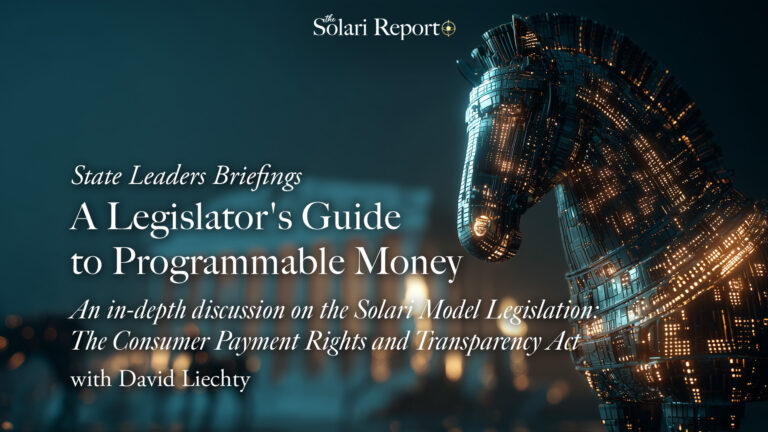
Missing Money 2021 Update with Mark Skidmore
Become a member: Subscribe
- Money & Markets
- Weekly Solari Reports
- Cognitive Liberty
- Young Builders
- Ask Catherine
- News Trends & Stories
- Equity Overview
- War For Bankocracy
- Digital Money, Digital Control
- State Leader Briefings
- Food
- Food for the Soul
- Future Science
- Health
- Metanoia
- Solutions
- Spiritual Science
- Wellness
- Building Weatlh
- Via Europa
Solari’s Building Wealth materials are organized to inspire and support your personal strategic and financial planning.

Missing Money
Articles and video discussions of the $21 Trillion dollars missing from the U.S. government
No posts
- LATEST
- TOP SECTIONS
- SERIES
- Money & Markets
- Weekly Solari Reports
- Ask Catherine
- News Trends & Stories
- Equity Overview
- Cognitive Liberty
- Young Builders
- Building Wealth
- The War for Bankocracy
- Digital Money, Digital Control
- State Leader Briefings
- Food
- Food for the Soul
- Future Science
- Health
- Metanoia
- Solutions
- Spiritual Science
- Wellness
- Via Europa
- BLOGS
- RESOURCES
- COMMUNITY
- My Account
- Log In
- Subscribe
- Search
- Shop
- Support
- Donate
- Log Out
The Papers
$21 Trillion Missing
- Missing Money 2021 Update
- Missing Money 2020 Update
- Thrift Savings Fund—Treasury Account 026×61531
- FASAB Standard 56 and the Authority of the Director of National Intelligence to Waive SEC Financial Reporting
News Coverage
Video Page
Case Studies
Space: The New Frontier For The Central Control Grid
Legal Series – US Monetary and Fiscal Operations
- he Appropriations Clause: A History of the Constitution’s (As of Yet) Underused Clause
- The U.S. Statutes Creating Modern Constitutional Financial Management and Reporting Requirements and the Government’s Failure to Follow Them
- The Black Budget: The Crossroads of (Un)Constitutional Appropriations and Reporting
- FASAB Statement 56: Understanding New Government Financial Accounting Loopholes
- National Security Exemptions and SEC Rule 10b-5
- Classification for Investors 101
- The History and Organization of the Federal Reserve: The What and Why of the United States’ Most Powerful Banking Organization
FASAB Statement 56
Missing Money Chronology
#my212020 & #constantamazement
The Real Game of Missing Money
- FASAB Standard 56 and the Authority of the Director of National Intelligence to Waive SEC Financial Reporting
- Should We Care about Secrecy in Financial Reporting?
- Reports on “Unsupported Journal Voucher Adjustments” for DOD & HUD
- Contractors, Investors, and Dealers
- Missing Money: A Personal History – 1989 to 2019
- Coming Clean Beyond the Fiscal Cliff
The Financial Coup & Missing Money: Quotes
Caveat Emptor
Dillon Read
Lighthouse Economics
Missing Money 2021 Update with Mark Skidmore


Addendum to Missing Money—June 2021: An Additional $94 Trillion in DOD Accounting Adjustments Reported in Bloomberg.
By Mark Skidmore
As described in previous reports and updates (Skidmore and Fitts, 2017), accounting adjustments are typically a small fraction of authorized spending, not many multiples of spending. Prior to this Bloomberg article, Skidmore and Fitts (2017) compiled government reports indicating that government had accumulated $21 trillion in unsupported journal voucher adjustments over the 1998-2015 period. The $21 trillion figure was so large at the time, bigger than the United States economy, that it resonated with the public. As a result, the “missing money” issue received considerable attention from both the alternative and legacy medias.
The $94.7 trillion figure dwarfs the $21 trillion, and yet to our knowledge no other news outlets picked up the story, and in fact we did not learn about the Bloomberg piece until January of 2021, thanks to Rob Kirby who brought the article to our attention. How is it that $21 trillion could make waves in the media and yet $94.7 trillion in account adjustments went largely unnoticed?
Focusing on fiscal year 2019, $35 trillion in accounting adjustments is 47 times the $738 billion in authorized DOD funding in that year, and 1.6 times U.S. GDP of $21.4 trillion. The enormity of the accounting adjustment defies any rational explanation. There are challenges in assessing the nature of the accounting adjustments because Capaccio (Bloomberg’s writer) does not make a distinction between “supported” and “unsupported” accounting adjustments, where unsupported adjustments have insufficient supporting documentation.
The article offers the following explanations for the accounting adjustments.
One Comment
Comments are closed.
Our mission is to help you live a free and inspired life. This includes building wealth in ways that build real wealth in the wider economy. We believe that personal and family wealth is a critical ingredient of both individual freedom and community, health and well-being.
Nothing on The Solari Report should be taken as individual investment, legal, or medical advice. Anyone seeking investment, legal, medical, or other professional advice for his or her personal situation is advised to seek out a qualified advisor or advisors and provide as much information as possible to the advisor in order that such advisor can take into account all relevant circumstances, objectives, and risks before rendering an opinion as to the appropriate strategy.
Be the first to know about new articles, series and events.

One Comment
-
Mr. Carpaccio seems to be Bloomberg’s Pentagon / DOD reporter who recently contributed to this UFO article
Comments are closed.




















































































































Mr. Carpaccio seems to be Bloomberg’s Pentagon / DOD reporter who recently contributed to this UFO article
https://www.bloomberg.com/news/articles/2021-06-25/ufo-sightings-stigma-is-gone-as-u-s-urges-pilots-to-speak-up